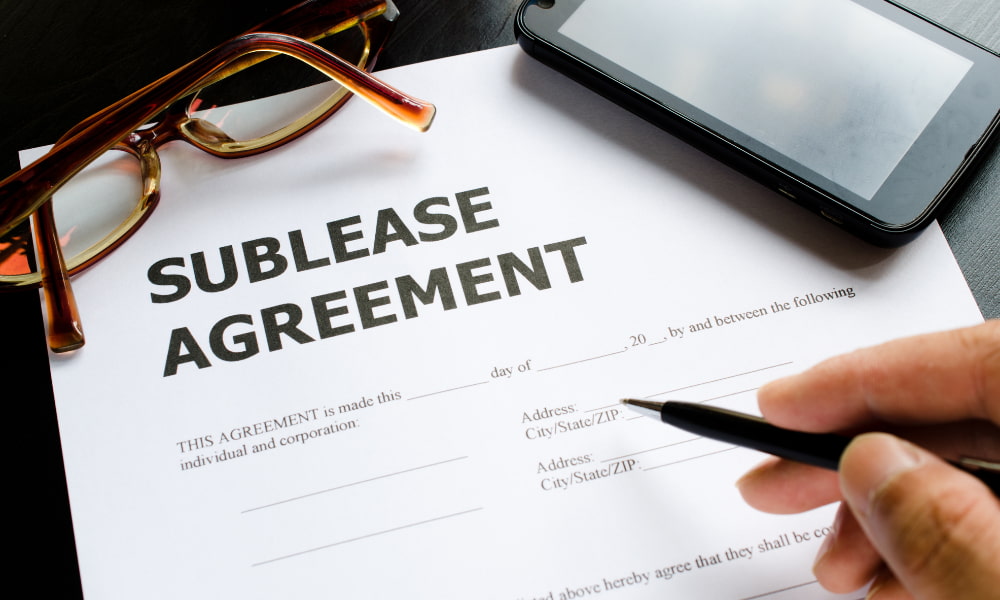A lot goes into negotiating a commercial sublease agreement, and it can often confuse even the most seasoned leaseholder. Commercial sublease agreements contain fine print and technicalities that you’ll want to keep an eye on to avoid future problems.
They are also different from traditional commercial lease agreements because they aren’t between the landlord and the tenant. This guide will provide the information you need to ensure your sublease agreement works for your organization and doesn’t land you in any trouble.
What Is a Commercial Sublease Agreement?
A commercial sublease agreement is a contract between a tenant and a sublessee. In some cases, a tenant might rent a space from a landlord and later discover that it’s too large. This tenant might then decide to lease part of the building to a sublessee to recover some of the cost.
A commercial sublease agreement can apply to any space, including office, industrial, and retail. The idea is that businesses shouldn’t have to waste space they don’t currently need when a smaller company is willing to pay for it and use it. Keep in mind that some landlords don’t allow subletting, so you’ll want to look into the legality of it before you begin.
Components You’ll Find in a Commercial Sublease Contract
Every commercial sublease contract is different, although there are some standard items that you’ll find on pretty much every agreement.
A Specific Location
The first thing that agreement should include is a physical address and a detailed description of the building. Both companies should incorporate their business names and full contact information. This section of the contract might define the lease’s length, as well.
Payment Information
Next, the agreement should look at payment information, such as
- when rent is due every month
- how much rent will be
- how the money will be paid

It’s also a good idea to define any late fees that will be charged when rent isn’t paid on time.
Responsibility For Additional Expenses
There are always additional expenses in a commercial space, so letting renters know what you expect of them is vital. Utilities, internet service, cleaning fees, and building security are all items worth considering, depending on how many of these charges the tenant is responsible for paying. The goal is for the two parties to share many of these expenses moving forward.
Contract Termination
Eventually, the partnership will run its course, so you’ll need some contract termination rules. There could be fees for lawyers, damage, collection, and cleaning, so pre-defining where that money will come from is a good idea.
You should also include information on penalties for breaking the lease early. There’s a lot of ground to cover when putting a commercial sublease agreement together, but following a few tips can ensure that the process goes smoothly.
Be sure to speak with a qualified commercial real estate expert if you’re unsure whether your commercial sublease agreement has all the components it needs. This professional can walk you through your contract and provide suggestions for missing items or worthwhile adjustments.
5 Tips For Signing a Commercial Sublease Agreement
In addition to the basic provisions that you’ll find on most commercial sublease agreements, there are some other aspects you’ll want to cover. By carefully including rules to protect yourself, you can reduce your financial risk throughout the contract.
1. Develop Rules for Common Areas
When sharing office space, there could be common areas that employees from both companies can access. These spaces can include break rooms, lobby space, washrooms, hallways, stairwells, and even parking spots.

Have some rules that determine who can use these areas and when they can use them, so you aren’t left fighting over a particular space when you need it for your business.
2. Create Signage Rules
When dealing with retail space, signs are often necessary to inform customers about the business’ location. However, you’ll want to reach an agreement in your sublessee regarding these signs’ placement and size. You don’t want your sublessee to take over your space by using too large or too prominent signage on the front of the building.
3. Approve All Space Alterations
In situations where your sublessee wants to alter the building, include a provision in the contract that gives you final approval over any changes.
You’re ultimately responsible for the property’s condition and on the hook for returning the space to its original state if your landlord disapproves. Ensure your sublessee doesn’t have free reign over these renovations that could end up costing you in the future.
4. Collect a Damage Deposit
There’s always the chance of damage occurring to your space, which is why you should collect a damage deposit from your sublessee.
That way, you will have access to funds to reimburse your landlord for these damages and will not be responsible for the charges yourself. Include provisions outlining the return of the damage deposit money in the contract, too.
5. Have a Check-In Inspection Form
Before allowing your sublessee to set up in the building, make sure a representative completes a check-in inspection form. This form acts similar to a walk-through at a residential property. The idea is that you and your sublessee will note any existing property damage, so it doesn’t become an issue at the end of the agreement.
Taking these supplementary measures provides additional protection throughout your agreement. The last thing you want is for extra charges or inconveniences to come your way because of your sublessee’s actions and damage your relationship with your landlord.
Get the Expert Advice You Need in Washington DC
Commercial sublease agreements are complicated documents because there are so many different aspects to consider. The goal is to protect both parties and prevent a legal battle when the deal comes to an end. Getting some professional advice is an excellent way to ensure that your contract covers your bases when subleasing a commercial property.
The Genau Group can assist with your commercial sublease contracts, providing you with the advice you need to create agreements that will protect you. Contact us for more information or help with your next commercial sublease agreement.






